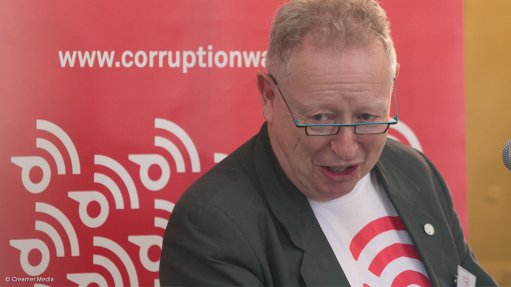
David Lewis
Photo by: Duane Daws
Anticorruption nonprofit organisation Corruption Watch says that given the thoroughly flawed and irregular proceedings of the Seriti Commission over the last four years, its report on its findings on the 1998 arms deal was hardly surprising.
This was in response to President Jacob Zuma’s release of the Seriti Commission’s report, on Thursday, which he said found no support or corroboration for allegations of corruption in selecting the arms manufacturers contracted by the South African government.
Zuma also said that the report did not encounter evidence that any of the “senior politicians in the government of the day” were bribed.
Corruption Watch executive director David Lewis said the report’s eventual failure to address long-standing allegations of corruption in the arms deal prevented closure of this “sordid chapter” in the governance of large scale public procurement.
Corruption Watch believed that there were three factors that clouded the findings of the report.
The organisation argued that to have found no evidence of corruption was unlikely as “there has hardly ever been an arms deal of this scale that is free of corruption”.
Further, there had been other judicial findings of corruption related to the arms deal over the past 20 years emanating from within and outside South Africa, which seemed to indicate that the commission had not been sufficiently thorough in investigating these allegations.
Finally, Corruption Watch argued that the commission’s execution of its mandate was flawed from the outset, and beset by manipulation, exclusion of documentary evidence, and prevention of access to critical information by various stakeholders.
“The ‘inferences’ that the commission claimed it was unable to draw were already present in several criminal convictions related to the deal, in the initial charges levelled against President Zuma by the National Prosecuting Authority, in the obscene sums paid to South African ‘consultants’ and held in foreign bank accounts, and, in the clear acknowledgement by some key foreign suppliers of suspicious payments to its ‘consultants’,” said Lewis.
He said that those were among the many ‘inferences’ that the commission was charged with investigating and added that the commission had clearly failed to discharge its mandate.